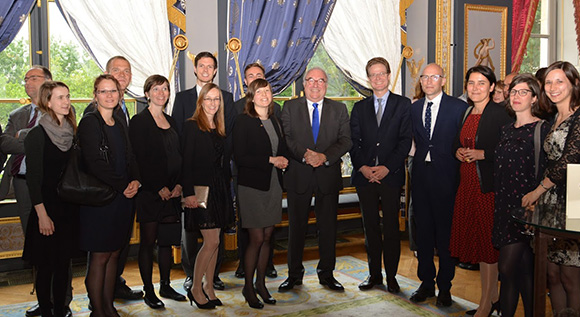Bonjour, Energiewende!
Two neighbouring countries faced with similar challenges – The Paris-based Franco-German Office for the Energy Transition is advocating close bilateral dialogue on energy. In future, this dialogue is to cover a wider range of issues.
 Parliamentary State Secretary Uwe Beckmeyer (6th from the right) at the celebrations for the 10th anniversary of the Franco-German Office for the Energy Transition (DFBEW) in Paris. © German Embassy in Paris/F. Brunet
Parliamentary State Secretary Uwe Beckmeyer (6th from the right) at the celebrations for the 10th anniversary of the Franco-German Office for the Energy Transition (DFBEW) in Paris. © German Embassy in Paris/F. Brunet
Germany has set itself ambitious targets for its future energy supply: in 2022, the last German nuclear power plant is to be decommissioned, by 2025, 45 per cent of the country's electricity supply is to be generated from renewables, and by 2050, our energy consumption is to be cut by half compared to the figure of 2008.
Two neighbouring countries faced with similar challenges
Last year, our French neighbours decided that they, too, want to strive for an "energy transition and green growth". A law by the same title has been in force since August 2015. The targets imposed under the new legislation notably include the following: by 2050, France wants to have halved its energy demand compared to 2012. By 2030, renewables are to account for 40 per cent of the country's power supply. Electric mobility is to really take off, and the consumption of fossil fuels reduced by 30 per cent by 2030, compared to 2012.
Two countries, similar challenges. This is reason enough to coordinate. From now on, the Paris-based Franco-German Office for the Energy Transition is to take on an even stronger role in this.
Fostering dialogue on renewables, energy efficiency, mobility and grids
The Franco-German Office was established ten years ago and has since been dealing with energy-related policy issues that affect both Germany and France. The focus has been on renewables. Now that Germany's energy transition has made major strides, with a great deal of renewables capacity being added, the Office is increasingly turning towards other issues including energy efficiency, mobility and grids.
After all, nothing could be more energy-efficient than to reduce the amount of electricity that has to be generated in the first place. And increasing the amount of power generated from renewables is not much use if there are no grids to take it where it is needed. Also, electric mobility is taking off in both countries, as the following figures show: in the first quarter of 2016, the number of newly registered electric vehicles was 8117. That's twice as many as in the first quarter of 2015. The comparative number for Germany was 5849, representing an increase of 28.6 per cent.
State Secretary Beckmeyer: "Flagship project within Franco-German cooperation"
Speaking at the celebrations for the tenth anniversary of the Franco-German Office for the Energy Transition, Parliamentary State Secretary Uwe Beckmeyer said: "The office is one of the flagship projects within our Franco-German cooperation. It therefore makes good sense for us to widen the scope of the office, now that the energy transition is making good progress in both our countries. After all, the energy transition will only be successful if we ensure even better dovetailing between the main pillars of our energy policy."
The Franco-German Office for the Energy Transition is a joint platform for cross-border information and dialogue. It brings together authorities and companies from both countries and promotes a transfer of knowledge and expertise. To this end, the office organises conferences, trade fairs and seminars and publishes information papers in both languages.
France has 58 nuclear power plants, Germany has 8
Incidentally, did you know that there are 58 nuclear power plants currently in operation in France? These account for 75 per cent of the country's power supply. Under the new legislation, the share of nuclear energy in the country's energy mix is to be reduced to 50 per cent by 2025. Germany now only has eight nuclear power plants in operation, accounting for approx. 14 per cent of our electricity. In Germany, nuclear power has been designated a bridging technology that is to be used only until renewables are reliable and cost-efficient enough to take over, and until the necessary infrastructure has been put in place. Last year, the share of renewables in our gross electricity generation first reached approx. 30 per cent.

